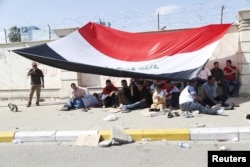Thousands of supporters of Iraqi Shi'ite leader Muqtada al-Sadr demonstrated in the center of Baghdad for a fourth consecutive Friday, amid calls for government reform.
Iraq's Interior Ministry said it refused permission for the protest, but security forces appeared to have relented. Iraqi television channels showed throngs of the al-Sadr supporters crossing several bridges into Baghdad's governmental Green Zone. Other video showed protesters setting up a sit-in inside the zone, which houses parliament, top leaders' residences, and the U.S. and British embassies.
Other demonstrators marched on Baghdad's central Tahrir Square.
Iraqi media reported that al-Sadr issued a statement to security forces “thanking them for assuring the safety of demonstrators” and allowing them to hold their sit-in.
One middle-aged protester sitting on cushions inside a sit-in tent told Iraqi media that he and fellow demonstrators were determined to continue their movement until it yielded results. He said the Green Zone was now open to the people and the sit-in protesters wouldn't leave the area until the entire regime was changed, adding that he hoped such change would happen soon.
Al-Sadr's spokesman, Sheikh Salah Obeidi, claimed that “hundreds of thousands of Iraqis are participating” in Friday's demonstrations “to demand reform of the government.” Al-Sadr has given the government 45 days to appoint a new cabinet made up of technocrats.
Iraqi Prime Minister Haider al-Abadi declared in a televised address earlier that he supported the people's right to demonstrate if they did so “legally.” He said citizens have the right to express opposition and to demand public services, the sanctioning of corrupt officials and reform — if it is done within the law.
Khattar Abou Diab, who teaches political science at the University of Paris, told VOA he thought al-Sadr was probably acting at the behest of neighboring Iran. He said al-Sadr is part of Iran's chess game in Iraq, alongside other pro-Iranian actors, and might be trying to develop a civil movement to protest corruption with Iran's encouragement.
Former Shi'ite Iraqi Prime Minister Nouri al-Maliki, an Iranian ally who was ousted as head of government in 2014 after bitter political wrangling, has expressed support for Sadr's protest movement.





